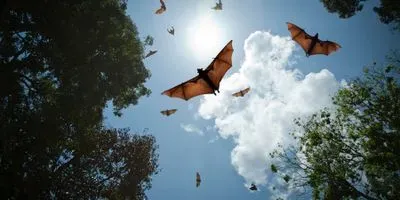CABI scientist Dr. Arne Witt has shared his expertise on invasive alien plant species as part of a new paper which argues that healthy ecosystems are vital in reducing the risk of future pandemics—such as coronaviruses (including COVID-19)—that threaten human health.
The paper—"Land use-induced spillover: priority actions for protected and conserved area managers,"—is published as part of a special issue by the journal PARKS entitled "COVID-19 and Protected Areas: Essential Reading for a World Haunted by a Pandemic."
Lead author Dr. Jamie K. Reaser—along with a team of researchers from institutions including the African Wildlife Foundation, the University of Oklahoma and the IUCN World Commission on Protected Areas—recommend practices to reduce the risk of future pandemics through "protected and conserved area management."
They rightly state that pandemic prevention "requires that human health be regarded as an ecological service" and call upon multi-lateral conservation frameworks to recognize that "protected area managers are in the frontline of public health safety."
The scientists highlight that land use change "drives the emergence and spread of microorganisms (pathogens) that infest wildlife and humans with severe consequences for environmental, animal, and human health."
The authors underscore the fact that, "The COVID-19 pandemic, caused by the SARS-CoV-2 virus, demonstrates society's inability to respond it a timely manner to novel pathogens. The result is mass human suffering and mortality, bringing substantial moral, ethical and economic dilemmas.
Related Article: How Scientists Stay on Top of Infectious Disease Outbreaks
A protected and conserved areas are the most widely used approaches to securing species and ecological integrity, they have a crucial role to play in safeguarding public health.
From our perspective, a 'healthy' ecosystem is one in which wildlife-pathogen interactions are in balance, wildlife are not overly stressed or concentrated together by land use-induced changes."

The scientists say that the strategic removal of invasive alien plants, that support populations of zoonotic pathogens, vectors or hosts, can function as an ecological countermeasure.
Witt said, "In Mauritius, for example, invasive alien plants have reduced the habitat quality of the Mauritian flying fox (Pteropus niger), resulting in increased foraging in agricultural lands and urban environments. Krivek et al. (2020) showed that non-native plant invasions reduced native fruit production and that weeded forests provide a better habitat for flying foxes. They conclude that their study lends support to invasive alien plant control as a management strategy in mitigating human-wildlife conflicts."
Reaser and the team of researchers put forward a series of proposals that reinforce existing conservation strategies while "elevating biodiversity conservation as a priority health measure."
The proposals include conducting surveillance about the occurrence of pathogens, or their clinical diseases, in animal or human populations as well as fostering "landscape immunity" in conserved and protected areas. The latter of which can be achieved, the scientists suggest, by measures including not disturbing landscapes and "retaining a full complement of native species and their inter-relationships."
Reaser and her colleagues conclude by arguing that, "Nations can no longer treat conservation as a second order priority. COVID-19 shows that we should now recognize that protected areas are at the frontline of public health infrastructure and that their managers are vital to disease prevention.
Looking ahead, we have to conserve nature as if our lives depended on it."
- This press release was originally published on the CABI website. It has been edited for style












